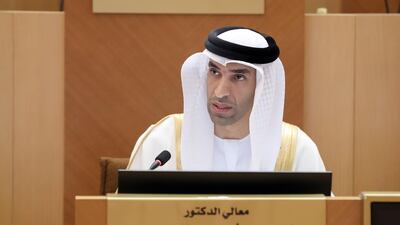Companies could be fined upto Dh1 million for incorrectly disposing of waste by landfill or burning according to a new draft federal law on integrated waste management.
More than three-quarters of the UAE’s waste is unrecyclable and could be used to regenerate energy, a Federal National Council member told the Minister of Climate Change and Environment on Tuesday.
The new law gives the Ministry the power to ban products deemed unrecyclable or harmful to the environment – after co-ordinating with a specialised authority.
The council highlighted the importance of the new law in protecting the environment and controlling the impact of waste generation on people's health. It also bolsters the country's efforts aimed at gaining economic benefits from wastes and introducing sustainable and smart solutions for treating them.
“Will the country really ban the production of plastic?” asked Saeed Al Remeithi, an Abu Dhabi member. “Importing it is much costlier, so I would like to clarify how that article would be implemented.”
Dubai member Marwan bin Ghlaitha also asked for clarity on the details of the law.
“Does co-ordinating mean absolute agreement? What if the ministry wants to implement the ban, and the concerned authority refuses?” he said.
Dr Thani Al Zeyoudi responded saying a decision would be made through the cabinet.
The law also gives the Ministry the right to demand companies recycle certain types of waste, should their reuse be considered less harmful than their disposal, and encourages the building of more recycling factories.
Mr bin Ghlaitha asked the minister why 77 per cent of the country’s waste is not recycled, particularly nuclear and radiant waste which could be used to regenerate energy.
The minister said Dubai Municipality already recycles 5,000 tonnes of waste a day to regenerate energy.
The UAE produces 6.5 million tonnes of non-hazardous waste per year, with individuals producing an average of 1.2 to 1.3kg of waste daily.
The law will also take to task people who burn, dispose of or bury waste in public areas or water channels by fining them up to Dh30,000.
Before the details of the law were discussed, FNC member, Salem Al Shehhi showed the minister pictures of quarries that produce toxic gases and heavily pollute the air.
“Public health is deteriorating because of this, and the ministry is doing its share of campaigns but unfortunately the co-operation from the manufacturers’ side is very weak,” said the member, who represents Ras Al Khaimah.
_______________
Read more:
FNC to question environment minister about organic produce and fishing bans
Special report: Abu Dhabi's dwindling water reserves charted in worrying Sorbonne research
_______________
“We are aiming for 90 per cent pure air by 2021. I don’t think we will be ready by then from the way things are now.
“There should be more co-ordination and more effort from the ministry to tackle the issue,” he said.
Dr Al Zayoudi responded saying the pollution from quarries was dealt with after 55 fines issued against offenders. He said the ministry has also carried 3,000 random inspections between 2014 and 2017.
____________
Read more on quarries:
Living near Fujairah quarry: 'harms children and ruins homes'
RAK residents call for high-emission quarries to be shut down
RAK quarries ordered to comply with environmental regulations
____________
The council also raised an official recommendation to the government to compensate fishermen affected by the country’s annual fishing ban on safi and sheri fish.
Dubai member Hamad Al Rahoomi presented the minister with videos that showed that 90 per cent of the fishermen’s catches during the two-month ban was sheri and safi.
“They have to throw back everything they caught and they would not even make up for the cost of the fishing trip.
“A number of ministry officials said the fishermen are free to catch other types of fish, but this is the reality of the situation during this season.
“We need to find a quick solution so the fishermen will not continue to suffer.”
Dr Al Zeyoudi said that despite the financial strain on fishermen, the bans have proved effective and fish populations have generally increased by 88 per cent between 2011 and last year.
“Increasing the fish is a goal that we aim for, but we ask that this vulnerable group, whose voices are barely heard, do not suffer as a result,” Mr Al Rahoomi said.
He said the country is making big investments to preserve natural water reserves, which the fishermen are banned from, so other areas should be open for fishing.
“Umm Al Quwain has spent Dh150 million on preserving the sea, why not decrease that budget, and use the money to compensate the fishermen?” Mr Al Rahoomi said.
Dr Al Zeyoudi said he would study the recommendation and return to the FNC with the results.


